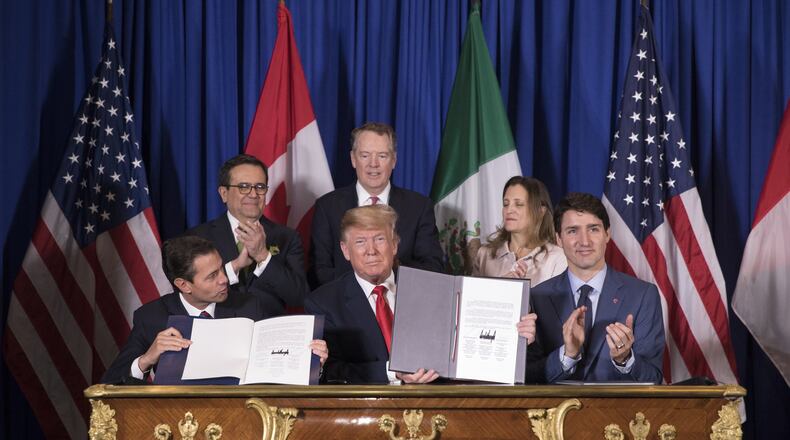In talks with U.S. Trade Representative Robert Lighthizer, Brown has suggested two changes he believes would improve chances of Congress approving the agreement, according to sources who asked not to be identified.
One change would require that U.S. companies which import goods from Mexico would have to certify that those products — under penalty of perjury — were made in compliance with the tougher labor and environmental standards of the new pact.
The other proposed revision would permit U.S. officials to inspect Mexican production facilities to determine if they were violating the labor and environmental standards. If they were in violation, they would lose the tariff reduction.
Brown has told the administration these changes would reduce incentives for U.S. companies to move production to Mexico.
President Donald Trump, Canadian Prime Minister Justin Trudeau, and Mexican President Enrique Peña Nieto announced the new agreement at a summit meeting in Argentina. During his 2016 presidential campaign, Trump was a vociferous critic of NAFTA, arguing it led to the loss of tens of thousands of manufacturing jobs in Ohio and the Midwest.
Portman, R-Ohio, who served as U.S. trade representative under former President George W. Bush, said the new pact “will create more jobs and expand economic opportunities for American workers, farmers, and manufacturers by leveling the playing field on trade.”
Portman made clear he could be counted on as an ally when the Trump administration next year seeks congressional approval of the agreement, which replaces the 1994 North American Free Trade Agreement.
But approval by Congress is not assured. Democrats will control the House next year, which means Trump will have to secure Democratic votes. Reaction from Ohio lawmakers broke mostly along party lines as House Republicans such as Steve Stivers of Upper Arlington, Warren Davidson of Troy, and Brad Wenstrup of Cincinnati praised the new deal while Democrats Tim Ryan of Niles and Marcy Kaptur of Toledo expressed deep misgivings.
Portman and Davidson appeared disappointed the agreement did not abolish the tariffs on steel and aluminum imports from Canadian imports. But, said Davidson: “While this deal is far from perfect, it is better than no deal, and better for America in many respects.”
“Failing to end high steel and aluminum tariffs between the United States, Canada, and Mexico is why this agreement should be considered progress, but incomplete,” Davidson added.
The Trump administration imposed those tariffs this year and critics have complained they have raised costs for automotive companies which rely on steel.
Wenstrup called the trade announcement “an important step in the right direction,” adding “the focus of trade deals should always be expanding and strengthening the American economy.”
By contrast, Kaptur said Trump has “claimed premature victory as U.S., Canadian and Mexican officials signed a tentative replacement for NAFTA.”
“This administration’s rush to sign something, creates more uncertainty for working people who have long suffered under NAFTA,” Kaptur said. “Congress will have the final say on trade but from where we stand today, President Trump’s campaign promises to working people and the reality of his NAFTA only reinforce this Administration’s standard: Say one thing, do another.”
About the Author
